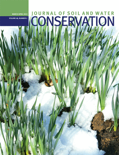
JOURNAL OF SOIL AND WATER CONSERVATION
Scope & Guideline
Fostering collaboration for sustainable land management.
Introduction
Aims and Scopes
- Soil Health and Management:
Research focused on practices that enhance soil health, including the use of cover crops, organic amendments, and conservation tillage to improve soil structure, nutrient cycling, and microbial activity. - Water Conservation Techniques:
Studies evaluating methods for conserving water resources in agricultural systems, including irrigation practices, watershed management, and the application of constructed wetlands for nutrient reduction. - Ecosystem Services and Sustainability:
Exploration of the relationship between agricultural practices and ecosystem services, emphasizing the role of soil and water conservation in promoting biodiversity, carbon sequestration, and climate resilience. - Policy and Socioeconomic Factors:
Analysis of the socio-economic barriers and incentives affecting the adoption of conservation practices among farmers and landowners, as well as the implications of policy frameworks on conservation outcomes. - Innovative Technologies and Approaches:
Application of advanced technologies such as artificial intelligence, remote sensing, and ecological modeling to assess and improve soil and water conservation practices.
Trending and Emerging
- Artificial Intelligence and Data-Driven Approaches:
An increasing number of studies are leveraging AI and machine learning techniques for assessing soil properties and predicting changes in soil health, reflecting the growing importance of data analytics in environmental research. - Climate Change Resilience:
Research focused on the impacts of climate change on soil and water systems is gaining traction, with an emphasis on developing adaptive management strategies that enhance resilience in agricultural practices. - Integrated Watershed Management:
There is a growing emphasis on holistic watershed management approaches that consider the interdependencies between land use, water quality, and soil health, promoting sustainable practices at a landscape scale. - Socioeconomic Influences on Conservation Adoption:
Emerging themes highlight the importance of understanding the socio-economic factors that influence farmers' decisions to adopt conservation practices, emphasizing participatory research and stakeholder engagement. - Use of Cover Crops and Agroecological Practices:
An uptick in research supporting the use of cover crops and agroecological practices reflects a shift towards sustainable agricultural systems that prioritize soil health and ecosystem services.
Declining or Waning
- Traditional Soil Erosion Studies:
Research centered solely on traditional soil erosion mechanisms and processes is becoming less prominent as the journal shifts towards integrated approaches that consider broader ecological and hydrological contexts. - Conventional Tillage Practices:
There is a noticeable decrease in studies advocating conventional tillage methods, as the focus has increasingly moved towards no-till and conservation tillage practices that enhance soil health and minimize erosion. - Single-Factor Analyses:
The journal has seen a decline in studies that assess single environmental factors in isolation, favoring instead multi-factor analyses that consider the interconnectedness of soil, water, and ecosystem dynamics. - Localized Case Studies:
Research that is highly localized without broader implications or applications is becoming less common, as the journal emphasizes studies with wider relevance to multiple regions or global challenges. - Static Models of Soil and Water Interaction:
There is a waning interest in static models that do not account for the dynamic interactions between soil, water, and biological systems, with a shift towards more adaptive and integrated modeling approaches.
Similar Journals

Revista Agrogeoambiental
Empowering Agricultural Innovation for a Greener FutureRevista Agrogeoambiental is a prestigious open-access academic journal dedicated to the field of agricultural and environmental sciences. Published by INST FEDERAL SUL MINAS GERAIS-I FSULDEMINAS since 2009, this journal stands as a vital forum for the dissemination of research findings, innovative methodologies, and interdisciplinary studies that address critical issues in agriculture and environmental sustainability. With a focus on promoting knowledge exchange among researchers, practitioners, and educators, Revista Agrogeoambiental seeks to enhance understanding of agroecological systems and their interaction with geospatial frameworks. As an open-access journal, it ensures that cutting-edge research is accessible to a wide audience, thereby fostering collaboration and knowledge-sharing in the global academic community. Researchers and professionals can benefit from the journal's commitment to high standards of scholarship, as well as its role in shaping policy and practice within the agricultural and environmental sectors.
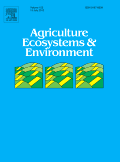
AGRICULTURE ECOSYSTEMS & ENVIRONMENT
Pioneering Insights in Ecosystem Management and AgronomyAGRICULTURE ECOSYSTEMS & ENVIRONMENT is a premier journal published by Elsevier, specializing in the fields of agronomy, animal science, and ecology. With an impressive impact factor reflective of its stature, it ranks in the top quartile (Q1) across three significant categories, highlighting its critical role in advancing research within the agricultural and environmental sciences. The journal serves as a vital platform for disseminating high-quality research that addresses the complex interactions between agriculture and ecosystems, providing insightful methodologies and findings that inform sustainable practices. As the journal continues to converge from 1983 and through to 2025, it remains committed to offering both traditional and innovative access options while contributing to the academic community's understanding of pressing environmental challenges. Researchers, professionals, and students are encouraged to engage with the journal's comprehensive content, which is positioned among the elite in its fields, having achieved top rankings in Scopus across relevant disciplines.
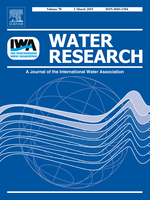
WATER RESEARCH
Empowering researchers to tackle urgent water issues.WATER RESEARCH, published by Pergamon-Elsevier Science Ltd, is a premier international journal dedicated to the advancement of knowledge in the interdisciplinary field of water science and technology. With a significant impact factor, WATER RESEARCH holds a distinguished position, consistently ranking in the top quartile (Q1) across multiple categories including Civil and Structural Engineering, Environmental Engineering, and Pollution. Established in 1967 and set to continue its legacy until at least 2024, this journal provides a vital platform for researchers and professionals to disseminate cutting-edge findings related to water sustainability, quality, and management. Although the journal follows a traditional access model, its commitment to disseminating impactful research ensures that it remains an essential resource for academia and industry alike. With a rigorous selection process, the journal includes articles that significantly contribute to the understanding and resolution of global water-related challenges, making it an invaluable asset for researchers, students, and practitioners engaged in this critical area of study.

AGROFORESTRY SYSTEMS
Bridging agriculture and forestry for sustainable solutions.AGROFORESTRY SYSTEMS, published by Springer, is a leading journal in the fields of Agronomy and Crop Science and Forestry. With an impressive impact factor and prestigious rankings—Q2 in Agronomy and Crop Science and Q1 in Forestry as of 2023—this journal occupies a vital niche in publishing high-quality research that intersects agricultural practices and forest management. The journal aims to advance the understanding of agroforestry practices, promoting sustainable land use and enhancing ecosystems worldwide. Operating since 1982, AGROFORESTRY SYSTEMS stands out with its rigorous peer-review process, ensuring the dissemination of significant scientific findings that contribute to both theoretical insights and practical applications. Although it does not currently offer open access, the journal continues to be accessible through various academic platforms, supporting researchers, professionals, and students in their pursuit of knowledge within this dynamic field.
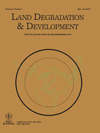
LAND DEGRADATION & DEVELOPMENT
Transforming knowledge into action for environmental stewardship.LAND DEGRADATION & DEVELOPMENT is a premier academic journal published by WILEY that has been at the forefront of research on the critical issues surrounding land degradation since its inception in 1989. With an impressive impact factor and ranked in the Q1 category across multiple fields including Development, Environmental Chemistry, Environmental Science, and Soil Science, this journal serves as an essential resource for scholars and professionals dedicated to sustainable land management and environmental conservation. Although it currently does not provide open access, its rigorous peer-review process ensures the publication of high-quality, impactful research that addresses vital environmental challenges. The journal aims to foster interdisciplinary collaboration, promote innovative solutions, and disseminate knowledge that not only informs policy but also empowers communities to combat land degradation effectively. Researchers, professionals, and students alike will find the insights and findings published in LAND DEGRADATION & DEVELOPMENT invaluable for advancing their understanding and practices within this critical field.
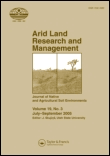
ARID LAND RESEARCH AND MANAGEMENT
Unlocking the potential of arid lands through research.ARID LAND RESEARCH AND MANAGEMENT is a leading journal in the field of Soil Science, published by Taylor & Francis Inc in the United Kingdom. With a focus on the sustainable management of arid and semi-arid lands, this journal aims to bridge the gap between scientific research and practical application. It garners a respectable impact factor, categorically positioned in the Q2 quartile within its field and ranks 59th out of 159 in Scopus, representing the top 63rd percentile of journals in Agricultural and Biological Sciences - Soil Science. As an essential resource for researchers, practitioners, and students alike, ARID LAND RESEARCH AND MANAGEMENT publishes high-quality, peer-reviewed articles that cover a wide range of topics, from soil conservation techniques to innovative land management practices. Open access options are available, facilitating broader dissemination of knowledge critical to addressing global challenges associated with arid environments. Targeting a pivotal area of study, this journal plays a significant role in advancing the understanding and management of these unique ecosystems, making it a valuable asset for anyone engaged in environmental sustainability.
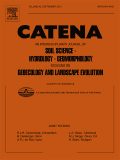
CATENA
Advancing Earth-Surface Science Through Rigorous ResearchCATENA is a distinguished academic journal published by Elsevier, focusing on the critical field of Earth-Surface Processes. With a solid foundation established in 1973, CATENA has continuously evolved, offering a platform for high-impact research and groundbreaking discoveries in geosciences. The journal holds an impressive Scopus rank of #8 out of 179 in its category, placing it in the top 5% of its field, which underscores its importance and influence among researchers and practitioners alike. While CATENA does not operate under an open access model, its commitment to disseminating essential findings is evident in its rigorous peer-review process and inclusion of diverse studies. Located in the Netherlands, CATENA not only serves as an essential resource for professionals and students but also contributes valuable insights that help address global environmental challenges.
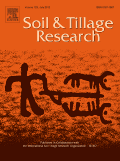
SOIL & TILLAGE RESEARCH
Elevating Knowledge on Tillage and SustainabilitySOIL & TILLAGE RESEARCH is a premier international journal dedicated to advancing the understanding of soil science and tillage practices through high-quality research and insightful reviews. Published by Elsevier and based in the Netherlands, this esteemed journal boasts impressive impact metrics, being ranked in the Q1 category across multiple domains including Agronomy and Crop Science, Earth-Surface Processes, and Soil Science, reflecting its pivotal role in the academic community. With an H-Index that underscores its citation impact and a Scopus ranking placing it in the top percentiles of its field, SOIL & TILLAGE RESEARCH serves as a vital resource for researchers and professionals focusing on sustainable agricultural practices, soil management, and environmental conservation. This journal provides a platform for open dialogue and dissemination of knowledge that shapes future research directions and policy-making in land use and sustainable agriculture.
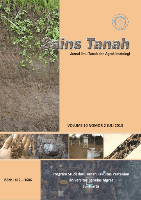
SAINS TANAH
Promoting Innovative Solutions in Soil Health and AgricultureSAINS TANAH is a renowned peer-reviewed journal that focuses on the fields of agronomy, soil science, and environmental studies, published by Universitas Sebelas Maret Surakarta in Indonesia. Established as an Open Access platform since 2001, it aims to disseminate high-quality research that addresses critical issues in soil health, crop management, and pollution, thereby fostering sustainable agricultural practices. With its current impact factor demonstrating a Category Quartile ranking of Q3 and Q4 in major areas such as Agronomy and Crop Science, Atmospheric Science, and Pollution, SAINS TANAH serves as an essential resource for researchers, professionals, and students dedicated to advancing knowledge and solutions in these vital fields. By providing a collaborative environment and upholding rigorous academic standards, the journal not only highlights the significance of Indonesian research contributions but also aims to connect local insights with global agricultural and environmental challenges.
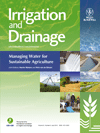
IRRIGATION AND DRAINAGE
Fostering dialogue and innovation in water resource management.IRRIGATION AND DRAINAGE, published by Wiley, is a prestigious academic journal that focuses on the critical fields of agronomy, crop science, and soil science. With an ISSN of 1531-0353 and an E-ISSN of 1531-0361, this journal serves as an essential platform for disseminating innovative research and insights relevant to the management of irrigation systems and drainage in agricultural practices. Based in the United Kingdom, the journal has shown a significant impact in its field, boasting a 2023 ranking in the Q2 quartile for both Agronomy and Crop Science and Soil Science. It ranks #149 out of 406 in Agricultural and Biological Sciences for Agronomy and Crop Science, and #66 out of 159 in Soil Science, placing it within the 58th to 63rd percentiles. This journal not only aims to advance knowledge in the sustainable management of water resources and soil health but also encourages open access to its content, making significant findings more accessible to researchers, professionals, and students alike. As it approaches its convergence period from 2001 to 2024, the importance of IRRIGATION AND DRAINAGE in shaping effective agricultural strategies continues to grow, fostering dialogue and innovation among its readership.